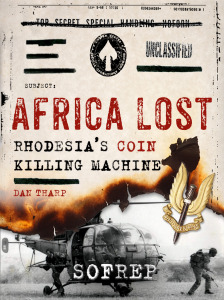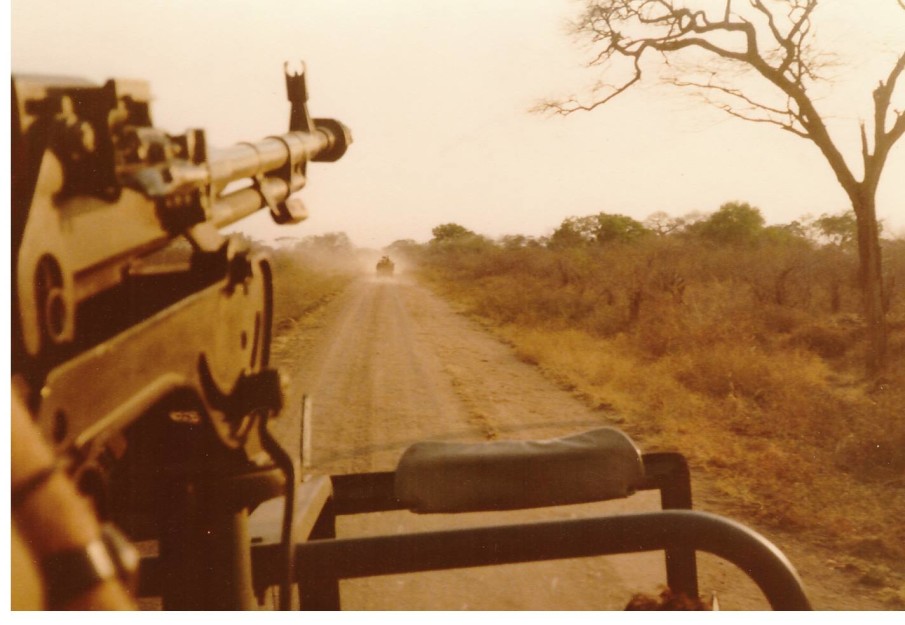In September of 1972, he found himself at a crossroads and began to express his disappointment on issues agreed upon by British Delegates and Ian Smith.
He was bother by unimpeded progress of Black Majority rule, stationing of foreign troops, an increase of parliamentary seats by nationalists, and coupling the Rhodesian dollar to the Pound.
He felt that these things were the exact opposite of the cause of independence and preservation of Western Civilization, and that African nationalism was simply a route for Communism to take over. His commitment to his enlistment vacillated, but he pressed on in hopes of fighting off the Red Hoard.
When he was posted to his unit he found it hard to bond with the troopers. Active front line troops require a certain mindset. Those living the lifestyle of possibly dying, often live their lives on the edge during their free time to escape the stress. The old adage of ‘you don’t send choir boys to fight a war’ rang especially true. Coey was a teetotaler and his mates might have taken his disinterest in the things young soldiers love as an affront.
He did manage to perform well enough to go for Officer’s Selection, which he was most excited about. His internal angst about Rhodesia adhering to a perfect ideology and an Army that enforced it caused some reluctance that was noted by the officers board. He was told, “You take life too seriously and you must project your personality and withdraw from your shell.”
He continued on but was dismissed from the course for academic and temperament issues. He began to realize that some of his views were considered subversive to the morale of the Rhodesian Army. His articles had reached the ears of people in charge and it was deemed best not to have an officer making any contrary statements to official stances within its ranks. He was rotated back to the SAS and began aggressive patrols searching out Terr camps. He determined that he would not be deterred and not falter on his personal beliefs. He enjoyed this but was still not meshing with the men of the SAS.
Things came to a head in December of 1973, when his Major said he would no longer be going on patrols and his jump pay would be revoked. He stated that Coey ‘just wasn’t worth it.’ It was a great humiliation that caused him to consider applying for a discharge, but instead he chose to go to the RLI.
Coey reassesed his purpose and goals and wrote this.
My purpose in coming to Rhodesia has been to fulfill my Christian duty of opposing Communism in two ways. First is to focus attention on the Conspiracy by refusing to be its pawn and by writing to expose it. The second is to actively fight Commuist-inpsired terrorism in Africa by Military service.
Even though he had become a victim of his own ideology in the SAS and Officers course, he was about to embark on what he felt to be his real mission and put actions behind his convictions.
Coey managed to stay on with the SAS in spite of his orders to stand down, and even went on another External to Mozambique, which caused the Major to initiate an opportunity to get rid of Coey. He demanded that he choose a different regiment or corps within the week. During this time, he reached his lowest point while in Africa.
Already have an account? Sign In
Two ways to continue to read this article.
Subscribe
$1.99
every 4 weeks
- Unlimited access to all articles
- Support independent journalism
- Ad-free reading experience
Subscribe Now
Recurring Monthly. Cancel Anytime.
He continued writing and published another article for Mr. Brown. He decided to take this proverbial ‘slap in the face’ as an opportunity to learn something new. It also prompted him to apply for a discharge from the Army entirely. It never went through. He had signed on for Five years and the Army was in no mood to let decent people leave. He would have to desert to get out of his contract. In the end, he remained resolute to stay with the cause that had brought him to Africa.
After a lengthy interview, he was given the option of attending the Medics Course in Bulawayo, which was six months long and would allow him to advance in rank to a full Corporal. In his journal, he wrote that he would be reposted to a combat outfit, hopefully the RLI in Salisbury.
Even though he enjoyed the education he was receiving, he wrote, “My inability to completely submit to organization has caused me much grief and embarrassment because, sometimes, I think too much of myself, instead of having confidence in those in authority over me. I have made mistakes, and they been my own fault. I cannot blame it on bad luck or circumstances. I hope I can redeem myself before leaving the Army, somehow…..”

Main Photo: Courtesy of Militaryphotos.net











COMMENTS